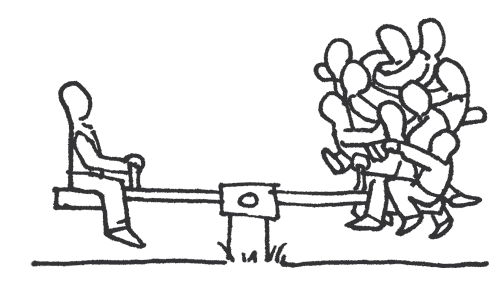The idea of achieving work-life balance never really squared with me. For those of us that spend the vast majority of our waking lives at work, the idea of trying to balance time between work and personal life seems like a losing proposition. Even when I can manage to “balance” my time– spending equal parts of my day on work-related issues and personal issues — that isn’t necessarily a formula for happiness. Sometimes those balanced days leave me utterly exhausted. The term ‘work-life’ balance also seems to suggest that one’s real life is somehow happening outside of work life. But when you think of work as a calling—finding meaning and joy in what you do for a living —work is every bit as much of your life as anything else is. For all of these reasons, I had pretty much scrapped the idea of work/life balance a long time ago.
Then I met Lisa Leit, founder of the Happy Whole Human program, who introduced me to a new way of thinking about a balanced life. She too rejects the notion of work-life balance. Instead, she asks people to think about the balance between attending to Self and attending to Others.
How much time are you dedicating to nourish and care for your SELF?
How much time are you dedicating to nourish and care for OTHERS?
Caring for the self isn’t just about taking time off to relax on a beach. It’s about taking the time to invest in yourself, to grow, to learn new things, to do whatever it is that brings you to life. When you do that, you’re in a much better place to give back and help others; and that’s ultimately what gives life meaning and helps create a sense of significance. Lisa’s work shows that this Self-Other balance is frequently out-of-whack and getting it right is absolutely essential for long-term well-being.
This self-other framework has been incredibly useful in calibrating my own life. When I feel myself beginning to throw a big ol’ pity party about how much I give for my clients, my children, my teams, my partner…I know that my little bucket is empty and I need to stop and take care of myself so that I can come back with renewed energy and actually have something valuable to give. (As any flight attendant will tell you, put your oxygen mask on first before you go to help others.) If you don’t take care of yourself, if you don’t invest time and energy into your own personal growth and development, you’re going to start feeling dead inside. Self-care isn’t selfish – it’s necessary to be in a good place — mentally, physically, spiritually, creatively — to give back. As my positive psychology teacher Tal Ben-Shahar says, it’s not selfish time, it’s self-FULL time.
That said, it is possible to become too focused on your Self – at the expense of getting things done or being there for the people depending on you. When you’re too focused on your Self, you’re likely to see relationships deteriorate and people at work actively avoiding you. And too much focus on the self will ultimately be a dead-end on the road to significance. At some point, you’ve got to use your well-honed talents in the service of others if you want to truly feel good about yourself. As Ghandi put it, the best way to find yourself is to lose yourself in the service of others.
The real challenge becomes creating a balance between self-care and caring for others… between personal growth and personal giving back…between filling your own cup and filling the cups of others.
 And, of course, the more you attend to your own needs, growing and developing into the best person you can be, the more you have to give back… and the more you give back the more you’ll want to grow and develop to be able to give back even more …and on and on it will go creating a virtuous upward spiral of growing and giving.
And, of course, the more you attend to your own needs, growing and developing into the best person you can be, the more you have to give back… and the more you give back the more you’ll want to grow and develop to be able to give back even more …and on and on it will go creating a virtuous upward spiral of growing and giving.
Where Lisa’s work gets interesting (and challenging) is that these self-other imbalances often arise from having either a narcissistic or codependent personality type.
Being chronically overworked, constantly putting your own needs aside is probably a boundary issue and a sign of codependency. While you may complain about your work life being all-consuming, secretly, you may like feeling like you’re the ONLY one that can take care of something, that others need you and that everything will fall apart without your involvement.
Conversely, narcissism – which at root stems from low self-esteem – might drive a commitment to self-improvement that, unchecked, becomes self-absorption that ultimately alienates others and hinders one’s ability to be a vital and contributing team or family member.
If you recognize either of these tendencies in yourself, best to deal with them first as doing so will be critical to the development of a healthy Self/Other balance in your life.
Next time you’re feeling like your life is out of balance, ask yourself:
Have I been too focused on taking care of others to the detriment of my own wellbeing? [Yes.] What can I do to fill up my own cup?
Have I been so focused on myself that I’ve let my work and my relationships suffer?
[Yes.] What can I do to fill the cups of others?
